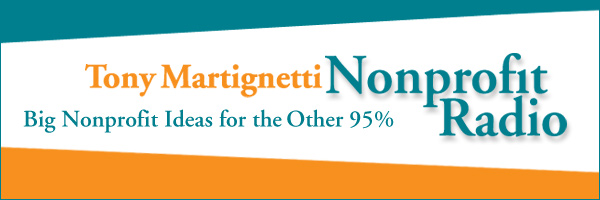I’m discussing Scary Scenarios for nonprofits with host Tony Martignetti on Nonprofit Radio this Friday, October 31, at 10 am PT / 1 pm ET. We hope you’ll join us as we talk about employee lawsuits, IRS Audits, excess benefit transaction penalties, and more!
UPDATE: If you missed us live, you can listen to the taped podcast here or on iTunes.
Red Flag Story: see if you can spot the potential problems …
Sara was on her way to a nonprofit board meeting when she ran out of gas on a dimly lit road. She was still 10 miles away from her destination without a building in sight. And she forgot her phone at home. The meeting would be starting in an hour and there appeared no way for her to make it in time.
Steadying her breath, Sara assessed the situation. It would be foolish to walk. But there were no other cars on the road, and she really had to get to that meeting.
The board was going to vote on a proposed contract with Sara to provide management services, as an independent contractor, operating the nonprofit’s newly launched social enterprise program, a bar whose profits would be used to fund the nonprofit’s charitable programs. A few days earlier, the board appeared to be split on the decision. Those in favor of the deal cited Sara’s experience and social network. Those against the deal cited the conflict of interest because of Sara’s position as a board member. With the other board members divided 50:50 on approval of the contract, Sara’s would be the determining vote.
Sara’s proposal involved her working full-time as manager of the new bar. She would be paid $10,000 per month, which was comparable to her pay as manager of one of the swankiest hotel bars in the city. In return, she would offer her services and provide to the organization the hotel bar’s contact list, which the nonprofit could use to solicit business.
As the meeting time approached, Sara powered on her laptop hoping for a wifi signal. Surprisingly, she found one, allowing her to send an email to the board chair stating that she was voting in favor of the contract.
Shortly after the meeting was over, Sara was informed by reply email that the contract was approved with 4 votes in favor (including Sara’s) and 3 against, with 3 absentee directors not voting. The next day, Sara rewarded herself with a new car.
Read on for a list of the potential problems …
Red Flag Story: potential problems –
- Sara’s conflict of interest with respect to approval of the contract between Sara and the nonprofit on whose board she sits. Such transactions are not necessarily impermissible for pubic charities but must be approved in a certain manner. Under California law, Sara’s vote could not be counted in determining whether the approval of the transaction was done appropriately to avoid characterization as a prohibited self-dealing transaction, and the approval would require a favorable vote by a majority of all directors then in office, not counting the interested director. Here, 5 out of 9 votes would have been required to approve the transaction, but there were only 3 votes in favor (excluding Sara’s).
- Operating a bar within the nonprofit. A 501(c)(3) organization must be operated primarily in furtherance of its charitable and/or other exempt purposes, and only an insubstantial amount of its activities can be operation of an unrelated business. If the bar is an unrelated business, notwithstanding the fact that all of the profits will be used to fund the nonprofit’s charitable programs, and it is a substantial part of the organization’s activities, the organization can have its 501(c)(3) status revoked. Further, the organization must consider the unrelated business income tax consequences of operating the bar.
- Sara’s compensation of $10,000 per month may be excessive with respect to the nonprofit. If her compensation was excessive, the employment arrangement may be considered an excess benefit transaction, which would force Sara to return the excessive amount to the nonprofit and pay a penalty tax to the IRS. The board members that approved such transaction knowing it to be excessive may also be hit with a penalty tax that may not be covered by insurance. Boards are well-advised to use the rebuttable presumption of reasonableness procedures to approve an insider’s compensation. Such procedures require approval by a disinterested body (e.g., board without the interested director’s vote) based on appropriate comparability data. Sara’s pay at one of the swankiest hotel bars may not be a suitable comparable for her pay at a new nonprofit bar, which is unlikely to have the same level of business as the hotel bar.
- Sara’s provision to the nonprofit of the hotel bar’s contact list. The hotel bar’s list may be considered a trade secret to which Sara has no individual rights. If the nonprofit accepts and uses the contact list, it may be infringing on the intellectual property rights of the hotel bar and subjecting itself to a lawsuit.
- Sara’s vote by email. Voting by email prior to, or during, a board meeting is generally not valid under state laws. Accordingly, even if Sara were permitted to vote as a director on a transaction with herself, her attempted email vote should not have counted. As a result, the contract was not validly approved.

